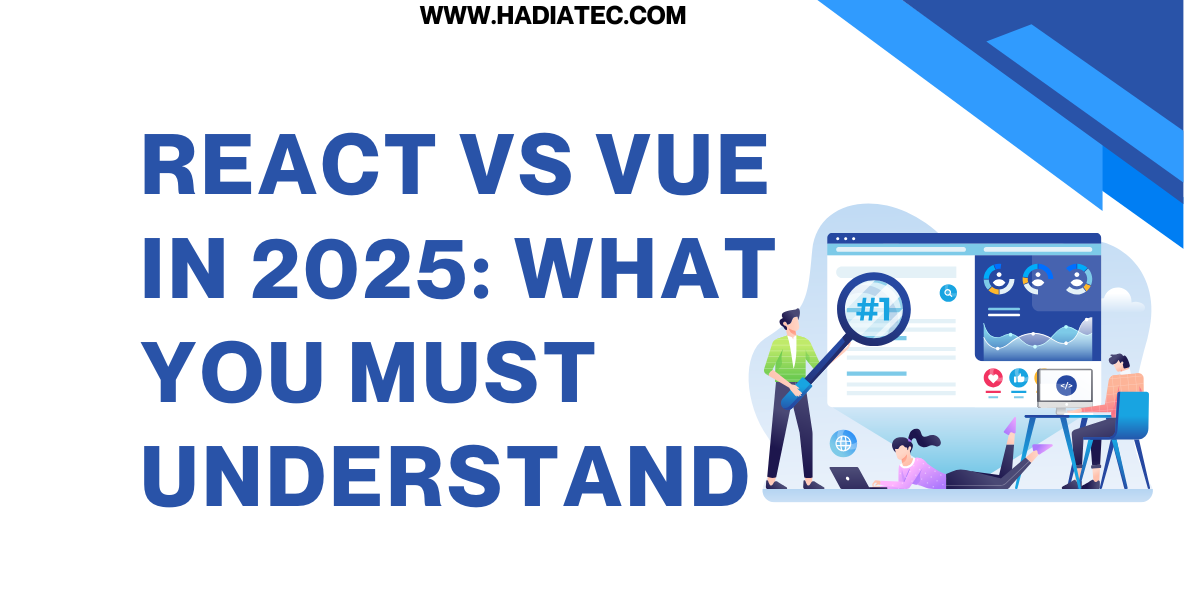React vs Vue in 2025: What You Must Understand
As the landscape of web development continues to change, the decision of how you choose your JavaScript framework makes or breaks your project. Heading into 2025, two of the reigning champions remain at the top of the agenda: React vs Vue. Both of them are well-known, very popular, and possess strong communities, but which one do you need to become proficient in?
This blog delves into an in-depth comparison of React vs Vue to assist you in determining which framework is best for you in 2025.

What is React?
Facebook (now Meta) developed React, a JavaScript library for building user interfaces, specifically for single-page applications (SPAs). With its virtual DOM and component-based model, React excels at generating dynamic, high-performing web apps. React remains a mainstream development tool in the industry in 2025, with its platforms being utilized by prominent companies such as Instagram, Airbnb, and Netflix.
Key Features of React
Component-Based Design: Developers can decompose sophisticated UIs into independent, reusable components using React.
- Virtual DOM: It slows down performance by limiting straight manipulations of DOM.
- Rich Ecosystem: With Next.js, Redux, and React Router, there is the flexibility of React at large scales.
- Strong Community: There’s a massive community that offers extensive resources, tutorials, and third-party libraries.
What is Vue?
Vue is an easy-to-work-with and extremely versatile JavaScript framework developed by Evan You. It’s most often described as being easy to use and easy to implement in any project. Vue was very popular in 2025 with startups and small groups because it had a high learning curve and excellent performance.
Major Features of Vue
- Reactive Data Binding: Vue’s two-way data binding makes it easy to work with state.
- Lightweight Framework: Vue is small at ~20KB, thus suitable for small projects.
- Vue CLI and Vuex: They simplify development and state management for complex applications.
- Beginner-Friendly: Vue’s clean syntax is due to it being simple, thus a programmer’s delight for beginners.

React vs Vue: A Head-to-Head Comparison
Let’s come straight to the point and highlight the most significant differences between Vue and React in 2025 so that you can choose what to learn.
1. Learning Curve
At times, it is hard to learn JSX, state management, and hooks. However, once you learn them, you will be able to create sophisticated applications with the versatility of React.
Vue: Vue is generally reported to be simpler for newbies. Its template syntax is almost regular HTML, thus simpler for JavaScript framework newbies. Vue’s detailed documentation also simplifies learning.
Verdict: As a newbie, Vue’s simplicity is simpler to manage. For those with some JavaScript experience, learning React is possible.
2. Performance
Both Vue and React utilize virtual DOMs, offering excellent performance for most applications. Both the frameworks are thoroughly optimized to be fast in 2025, with React benefiting from Concurrent Rendering improvements and Vue performing very well on account of its reactive architecture.
React: Works best in large-scale applications when performance is crucial, as libraries like Next.js are highly optimized.
Vue: Plays very well with small to medium projects with minimal overhead as it is lightweight.
Verdict: Both are performant, but React may edge it for large, complicated applications.
3. Community and Ecosystem
There are numerous libraries to aid with quick development with libraries such as Material-UI, Ant Design, and Create React App. The career market for React is good in 2025, with many companies recruiting React developers.
Vue: Vue has a smaller but rapidly expanding user base. It’s extremely popular in regions such as Asia and startups. Vue’s ecosystem, e.g., Nuxt.js and Vuex, is respectable but not as extensive as React’s.
Verdict: React’s larger ecosystem and career prospects are the top choice for career-focused developers, but Vue’s ecosystem is healthy and sufficient for most projects.
4. Flexibility vs. Structure
React: Provides unbridled freedom and enables developers to pick tools and organize projects on their whim. But freedom leads to decision paralysis and trash codebases.
Vue: Walks the structure/freedom tightrope. Conventions and tools such as Vue CLI impart structure without cutting off freedom.
Verdict: React for developers who need flexibility and Vue for developers who require a structured environment.
5. The Job Market in 2025
React: React dominance of the 2025 job market rages on unabated. The popularity of business apps means sustained demand for React developers. Salaries of React developers remain competitive, particularly in the tech metropolises.
Vue: Vue career is in growth, especially in startups and in places such as China. It’s not as much in demand as React, but Vue developers are also becoming well-liked for being high-quality to work with to get fast projects done.
Verdict: React has more career opportunities, but Vue is an appropriate pick for niche work.

What Do You Need to Learn in 2025
Based on your audience, experience, and requirements of your project, whether React or Vue is for you is up to you. Here’s a quick rundown to guide you through:
Choose React if:
- You’re building a career in enterprise or large-scale development.
- You’re seeking flexibility and wish to tap into a huge ecosystem.
- You desire it to be more soaked and wish to access a strong job market.
Choose Vue if:
- You are beginning with Vue and having a smooth learning curve.
- You are developing small- to medium-sized apps or startups.
- You prefer simplicity and rapid prototyping.
Can You Learn Both?
Yes! Both Vue and React have a lot of similar things, like a component-based system and a virtual DOM. If you already know one, it will be simple to learn the other. In 2025, most developers are developing on one but have both in hand so that they can be flexible.
Final Thoughts
Both in the React vs Vue war, neither is particularly victorious—both are strong. Both are still very much a part of the game in 2025. The sheer dominance of React in the labor market and humongous ecosystem draw the majority of developers, while the loadlessness and simplicity of the Vue framework are attractive to users who wish to make their usage simpler and speed up development. The choice then depends on your project needs and professional objectives. Either React or Vue, whichever you decide to learn, the time spent learning either of them will set you up with skills to be employed in future web development.





